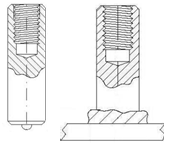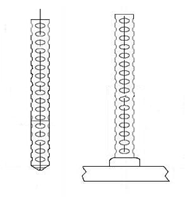As engineering standards continue to develop and improve, there seems to be an increasing need for weldable rebar anchors and couplers. To the average fabricator, these wealth of options represent an opportunity for additional profit but requires some understanding of how each system works.
Here are four types of couplers and studs to consider:
Weldable Coupler - Threaded

This coupler/anchor is penetration welded to its steel member. This is accomplished by being internally threaded with a tapered thread that perfectly matches the rebar thread.

Weldable Coupler – Set Screws

For its connection to the steel member, this coupler employs the same penetration weld as the one above. The difference is that it does not require a threaded rebar. Instead, the rebar is inserted and the set screws are tightened to ensure positive anchoring.

Internally Threaded Weld Studs

Weld Studs have straight barrels, as in no head, and internal threads. An example of this would be a straight UNC thread with no taper. The Penetration Weld is no longer required. Weld Studs, by design, automatically have a full weld.

Deformed Bar Studs

These deformed bars serve the same function as weld studs, and they can be installed with stud welding machinery. However, transportation problems and jobsite safety regulations prohibit this from being done in the fabricating shop. These studs are welded in the field after erection. As a result of the positioning of the anchors, which are typically close to the grade or close to parallel steel surfaces, this becomes a two man process.
Note: All changes must be reviewed and approved by the controlling architects and engineers. We are available to speak to them directly and answer any questions they have.





